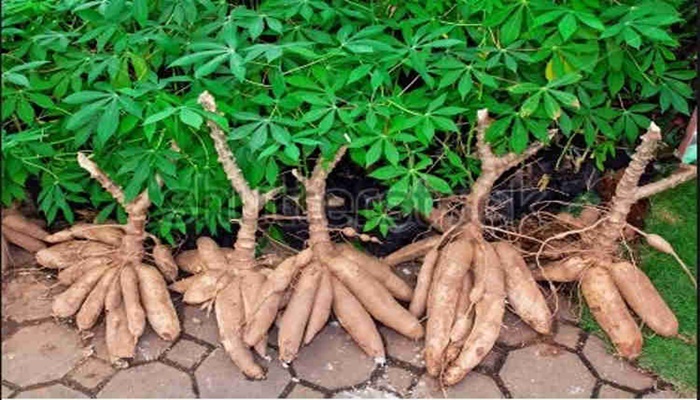IITA working with partners to build sustainable cassava seed system

The International Institute of Tropical Agriculture (IITA), Ibadan, and stakeholders are working to tackle farmers’ lack of access to high quality cassava planting materials.
The IITA Digital Extension and Advisory Services Specialist, Mr Godwin Atser, who disclosed this in a statement in Ibadan on Friday, said the project, which will build sustainable cassava seed system in Africa, was getting a new phase.
According to him, the stakeholders are working to address this problem by developing a new and more sustainable cassava seed system that makes high quality stems of high yielding varieties available for sale to African farmers.
He said that the work started in Nigeria five years ago as a programme called, ‘‘Building an Economically Sustainable, Integrated Cassava Seed System (BASICS).’’
“Some 150 cassava seed enterprises were created in Benue, Abia, Akwa Ibom, and Imo states to multiply and sell cassava stems, following a business model that is both profitable and beneficial to its farmer clients.
“A sister project in Tanzania nurtured a similar network of cassava seed entrepreneurs, government agencies certify the stems to ensure quality.
“In June, this programme benefited from a new investment of 14.3 million dollars by the Bill & Melinda Gates Foundation to consolidate and expand this work in both Nigeria and Tanzania under the project name of BASICS-II.
“The goal of the project is to provide farmers with access to affordable, quality-assured seeds of the cassava varieties in demand by local food and processor markets through the establishment of a commercially viable seed value chain operating across breeder, foundation, and commercial seed levels.
“BASICS-II will create a more efficient dissemination and trigger the adoption of new varieties to improve productivity; raise incomes of cassava growers and seed entrepreneurs; enhance gender equity and contribute to inclusive agricultural transformation in Nigeria and Tanzania,” he said.
The statement also quoted the IITA Director-General, Dr Nteranya Sanginga as saying that the approval of BASICS-II provided a window of opportunity for cassava farmers.
Sanginga said it would create new lines of income for them while at the same time catalyzing the diffusion of new varieties.
Also, Dr Alfred Dixon, IITA Director for Development & Delivery, and Technical Adviser to BASICS-II, said the coming of BASICS-II would not only create seed enterprises, but also spark the diffusion and adoption of improved disease-free cassava varieties that would offer farmers higher yield.
“To me, this is the most exciting part of the project.
“Over the years, IITA and its national partners have developed over 40 cassava varieties but the diffusion and adoption of these varieties have been low due to the absence of a functional seed system to incentivize their multiplication, distribution, and sales,” he said.
Dr Lawrence Kent, a Senior Programme Officer, Bill and Melinda Gates Foundation, also said that the new phase of the BASICS project would strengthen and expand its innovative approach to the supply of cassava planting materials.
He added that it would help farmers in Nigeria, Tanzania, and eventually additional countries to access and purchase disease-free stems of the most productive, demanded, and promising cassava varieties.
Also, the Project Manager, BASICS 11, Prof. Lateef Sanni said cassava was grown mostly by resource-poor farmers, but its productivity had been constrained by lack of access to improved varieties with national average yield reported at less than 10 tons per hectare in Nigeria.
“Even when the best of agronomic practices is employed, yields remain poor if the seeds are not right.
“Through the activities of BASICS-II, it is envisaged that this narrative will be changed,” he said.
The five year project will be led by IITA, with Mennonite Economic Development Associates (MEDA), National Agricultural Seeds Council (NASC), Tanzania Agricultural Research Institutes, among others. (NAN)






